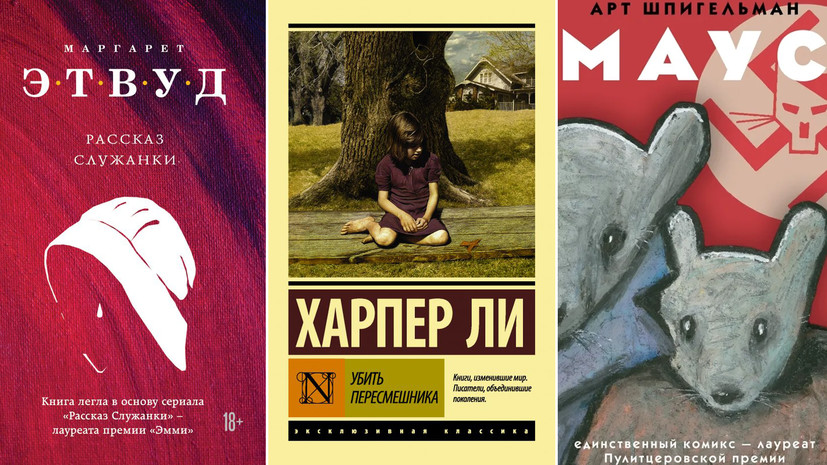In recent years, in the United States and some European countries, literary works and other works of art, including classics, have been censored and prohibited from being shown to children and adolescents.
The Handmaid's Tale by Canadian author Margaret Atwood is one of the most criticized or banned books in schools, according to the American Library Association.
In protest against the restrictions, the author released a literally fireproof version of the novel.
In the announcement video, the writer unsuccessfully tries to burn her book with a flamethrower.
“In the United States and around the world, books are criticized, banned, and even burned.
Therefore, we have prepared a special edition of a book that has been criticized and banned for decades,” Penguin Random House said in a statement.
The book, created to be sold at auction, is made of fireproof materials.
As emphasized by Penguin Random House, the publication "is designed to protect this extremely important story and act as a powerful symbol against censorship."
First published in 1985, The Handmaid's Tale is set in a future where women are inferior.
They cannot be educated, own property or work.
"Servants" are forced to bear the children of wealthy, but barren parents.
Shortly after its release, the novel was awarded a number of literary awards.
A new round of his popularity began in the second half of the 2010s after the release of a multi-part film adaptation starring Elisabeth Moss.
However, the book has been criticized for its sexual explicitness and approach to portraying religion - the work allegedly offends Christians.
Margaret Atwood disputed all claims.
“Firstly, I am very surprised by the phrase “offends Christians”.
Nowhere in the book does it say that the world is Christian.
As far as scenes of a sexual nature are concerned, there is far less interest in sex in The Handmaid's Tale than in much of the Bible, ”the writer said in an interview with The Guardian.
As columnist Claire Armitstead notes, there were cases of book bans even before our era.
The first list of works banned under Christianity appeared in the fifth century.
The reasons have changed over the years, among the main ones are religion, obscenity and political views.
For example, in 1749, more than a century before the Obscene Publications Act was passed in Great Britain, the writer John Cleland was charged because of explicit scenes in Fanny Hill.
Memoirs of a comfort woman.
The novel Lady Chatterley's Lover by David Herbert Lawrence was freely available in France and Italy for a long time, and in 1960 the book was published in the UK.
The local publishing house was held accountable.
However, after a six-day trial, the jury found the book not obscene.
She also raised questions in the US, Canada, Japan, Australia and India.
Recently, cases of bans have become more frequent.
According to Susan Nossel, head of the pro-free speech and anti-book ban organization PEN America, if earlier such news appeared several times a year, now it is every week or more often.
At the same time, the initiative comes not only from schools - some decisions are made at the legislative level.
In 2021, a list of over 800 books was published that are not recommended for inclusion in Texas school libraries.
Among them are works that touch on racial issues, books about puberty and more.
Some publications purportedly force the reader to "experience discomfort, guilt, intense distress, or any other form of psychological stress because of one's race."
In Tennessee, the school board voted to remove Art Spiegelman's classic Holocaust graphic novel Maus from the program.
Among the reasons are frank scenes, swearing (mostly dissatisfaction with the council was caused by the expression god damn - "damn it") and one of the characters is a suicidal mouse, personifying the writer's mother.
At the same time, Spiegelman himself, while working on the work, did not focus on children.
In his novel, he expressed his feelings about the effects of the Holocaust on his parents.
The fact that the book began to be studied in schools touched the writer at first.
Then, however, he spoke to readers and found it acceptable.
Modern trends have also touched Agatha Christie's bestseller "Ten Little Indians".
In 2020, it became known that in France the book would be republished with a new title and the word “negro children” would be removed from it, replacing it with “soldiers”.
Previously, the work was renamed in the UK, and in the US it was originally released under a different name.
“When this book was written, the language was different and words were used that are already forgotten today,” said a relative of the writer.
In 2021, activist Rachel Adamson criticized the children's book The Tiger Who Came for Tea by Judith Kerr.
The work allegedly presents an old-fashioned image of the family, which reinforces gender inequality and leads to violence against women.
According to the story, a woman and her daughter sit down to drink tea.
A tiger comes to them and eats all the food in the house and drinks all the drinks, and then leaves.
The hostess understands that now she has nothing to feed her husband.
The situation is saved by the husband himself - he leads the family to a cafe.
Some readers also found political overtones in the work, but Kerr herself claimed that she did not put hidden meaning into the story.
According to her, the tiger is just a tiger that was hungry and wanted tea.
The British State Commission "English Heritage" saw signs of racism and xenophobia in the works of Enid Blyton ("The Little Black Doll", "The Secret That Never Was"), and in the works of Rudyard Kipling found "imperialist views and romanticization of colonialism".
Several educational institutions in the United States accused Harper Lee of inciting ethnic hatred due to the use of the word "niger" in the novel "To Kill a Mockingbird", and excluded the book from the program.

